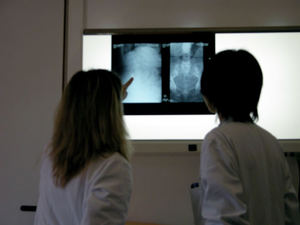In many Florida personal injury cases, either side may request a plaintiff undergo a compulsory medical exam. This is a medical exam conducted to establish or refute arguments made by the opposing side.

Our Fort Lauderdale personal injury lawyers know that while courts often grant these requests, they are not permitted to do so unless good cause has been shown and the parameters are clearly outlined. The exam has to involve a matter that is “in controversy” in the case. That is, it involves a key point that is critical to the requesting side’s position.
This issue was recently before two separate appellate courts in different cases, with one court denying the request and another choosing to narrow it significantly.
In the first case, Gray v. Richbell, the Fourth District Court of Appeal was tasked with deciding the propriety of the trial court’s granting a plaintiff’s request to require a defendant driver to submit to a compulsory medical exam. The appellate court ruled it was not, primarily because the goal of the exam hadn’t been “in controversy.”
Here, the plaintiff’s daughter died an untimely death in an automobile accident. Traffic reconstruction experts have indicated the decedent was passing a tractor-trailer on a two-lane road. At the same time, the vehicle behind her took the same action and rear-ended her. The impact caused her to barrel into the oncoming lane of traffic, where she was struck head-on by a truck driven by the defendant.
Plaintiffs argued the defendant negligently failed to take evasive action to avoid the crash. They theorized the defendant’s physical condition and age contributed. However, the plaintiff’s expert witness blamed the defendant without examining the medical record. Still, the plaintiffs sought and received the defendant’s medical records and interviewed his treating physicians. Based on the findings, plaintiffs sought to require the defendant to submit to a medical exam.
The defendant argued that he was either negligent or he wasn’t, but his medical condition had not been placed into controversy. While the trial court rejected the defendant’s argument, the appellate court reversed, finding the defendant’s conduct – not his health – was at issue in this case. Thus, an exam was beyond the scope necessary for the plaintiff to prove its case.
Several days later, the Fifth District Court of Appeals took on Maddox v. Bullard. This was a dog bite case, and the defense had requested a compulsory medical exam to refute the plaintiff’s claim for damages pertaining to mental pain and anguish.
The trial court granted the order, but failed to specify the scope of the exam, allowing, in the words of the appellate court, the psychologist “cart blanche” to perform any type and all manner of exams, testing and psychological inquiry for up to four straight hours. This, the court ruled, would have been a miscarriage of justice. The court quashed the order and indicated the defendant could request a new exam, so long as it met the legal requirements.
Compulsory medical exams are often a necessary part of civil injury trials, ranging from medical malpractice to car accident injury. The findings of these exams can serve to make or break a case, as they are incorporated into expert witness testimony. It’s therefore imperative that injured parties seek experienced legal counsel to help guide them on such matters.
Call Fort Lauderdale Injury Attorney Richard Ansara at (954) 761-4011. Serving Broward, Miami-Dade and Palm Beach counties.
Additional Resources:
Maddox v. Bullard, July 11, 2014, Florida’s Fifth District Court of Appeal
More Blog Entries:
Court: Federal Maritime Law Won’t Apply to DUI Case, July 6, 2014, Fort Lauderdale Personal Injury Lawyer Blog
 Broward Injury Lawyer Blog
Broward Injury Lawyer Blog



